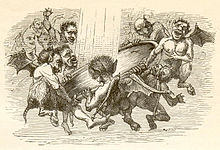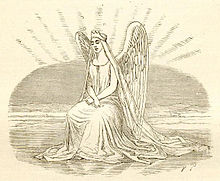"The Snow Queen" (Danish: Snedronningen) is an original fairy tale written by Danish author Hans Christian Andersen. The tale was first published 21 December 1844 in New Fairy Tales. First Volume. Second Collection. 1845. (Danish: Nye Eventyr. Første Bind. Anden Samling. 1845.). The story centres on the struggle between good and evil as experienced by Gerda and her friend, Kai.
The story is one of Andersen's longest and most highly acclaimed stories. It is regularly included in selected tales and collections of his work and is frequently reprinted in illustrated storybook editions for children.
Story
Vilhelm Pedersen illustration.
These splinters are blown by the wind all over the Earth and get into people's hearts and eyes, freezing their hearts like blocks of ice and making their eyes like the troll-mirror itself, seeing only the bad and ugly in people and things. There was only one way to get it out.
Vilhelm Pedersen illustration
Kai's grandmother tells the children about the Snow Queen, who is ruler over the "snow bees" — snowflakes that look like bees. As bees have a queen, so do the snow bees, and she is seen where the snowflakes cluster the most. Looking out of his frosted window one winter, Kai sees the Snow Queen, who beckons him to come with her. Kai draws back in fear from the window.
By the following spring, Gerda has learned a song that she sings to Kai: Roses flower in the vale; there we hear Child Jesus' tale! Because roses adorn the window box garden, the sight of roses always reminds Gerda of her love for Kai.
On a pleasant summer day, splinters of the troll-mirror get into Kai's heart and eyes while he and Gerda are looking at a picture book in their window-box garden. Kai becomes cruel and aggressive. He destroys their window-box garden, he makes fun of his grandmother, and he no longer cares about Gerda, since all of them now appear bad and ugly to him. The only beautiful and perfect things to him now are the tiny snowflakes that he sees through a magnifying glass.
The following winter, Kai goes out with his sled to play in the snowy market square and — as was the custom — hitches it to a curious white sleigh carriage, driven by the Snow Queen, who appears as a woman in a white fur-coat. Outside the city she reveals herself to Kai and kisses him twice: once to numb him from the cold, and a second time to make him forget about Gerda and his family; a third kiss would kill him. She takes Kai in her sleigh to her palace. The people of the city conclude that Kai died in the nearby river. Gerda, heartbroken, goes out to look for him and questions everyone and everything about Kai's whereabouts. She offers her new red shoes to the river in exchange for Kai; by not taking the gift at first, the river lets her know that Kai did not drown. Gerda next visits an old sorceress with a beautiful garden of eternal summer. The sorceress wants Gerda to stay with her forever, so she causes Gerda to forget all about Kai, and causes all the roses in her garden to sink beneath the earth, since she knows that the sight of them will remind Gerda of her friend. However, a while later, whilst playing in the garden, Gerda sees a rose on the sorceress's hat, then remembers Kai and begins to cry. Gerda's warm tears raise one bush above the ground, and it tells her that it could see all the dead while it was under the earth, and Kai is not among them. Gerda flees and meets a crow, who tells her that Kai is in the princess's palace. Gerda goes to the palace and meets the princess and the prince, who is not Kai, but looks like him. Gerda tells them her story, and they provide her with warm clothes and a beautiful coach. While traveling in the coach Gerda is captured by robbers and brought to their castle, where she befriends a little robber girl, whose pet doves tell her that they saw Kai when he was carried away by the Snow Queen in the direction of Lapland. The captive reindeer Bae tells her that he knows how to get to Lapland since it is his home.
Vilhelm Pedersen illustration
| I can give her no greater power than she has already," said the woman; "don't you see how strong that is? How men and animals are obliged to serve her, and how well she has got through the world, barefooted as she is. She cannot receive any power from me greater than she now has, which consists in her own purity and innocence of heart. If she cannot herself obtain access to the Snow Queen, and remove the glass fragments from little Kai, we can do nothing to help her |
Vilhelm Pedersen illustration
Kai and Gerda find that everything at home is the same and that it is they who have changed; they are now grown up, and are also delighted to see that it is summertime.
At the end, the grandmother reads a passage from the Bible:
"Assuredly, I say to you, unless you are converted and become as little children, you will by no means enter the Kingdom of Heaven" (Matthew 18:3)






No comments:
Post a Comment